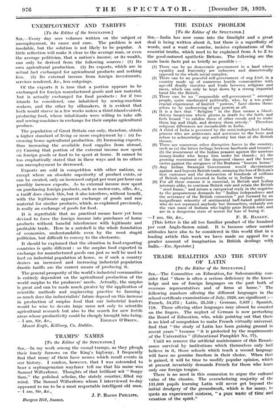THE INDIAN PROBLEM
[To the Editor of the SPECTATOR.]
SIR,—India has now come into the limelight and a great deal is being written about it, but there is a superfluity of words, and a want of concise, incisive explanations of the essential truths, which need to be explained from A to Z to the good-natured apathetic Britons. The following arc the main basic facts put as briefly as possible :—
There can be no democratic government in a land where equality and fraternity are unknown and diametrically opposed to the whole social complex:
(2) There can be no peaceful self-government of any kind, in a country made up of numerous hostile communities with age-old deadly enmities and feuds between religions and races, which can only be kept down by a strong impartial hand like the British.
There can be no " responsible self-government " amongst people, quite uneducated politically, who; by a ten years' crucial experiment of limited " powers," have shown them- selves to be undeserving of any powers at all. (4) It is a fact that " Religion " in the East means a blood- thirsty fanaticism which glories in death for the faith, and feels bound " to subdue those of other creeds and to smite them hip and thigh, and destroy them utterly." Therefore religious differences are ineradicable in India.
A third of India is governed by the semi-independent Indian princes who are aristocrats and autocrats to the bone and refuse to acknowledge any authority but that of the British throne.
(6) There are numerous other disruptive forces in the country, such as (a) the bitter feelings between landlords and tenants ; (b) the resentment of the Indian peasant against the usurious money-lender who keeps him under his thumb ; (c) the growing resentment of the depressed classes and the lower castes against the arrogance of the Brahmin "heaven bores." Any Indian Swarajist Government wou'Al discriminate against and boycott British trade, meaning the loss of Britain's best customer and the destruction of hundreds of millions of British capital invested in India or in Indian trade. For all these reasons it is essential, in British and Indian interests alike, to continue British rule and retain the British " steel frame," and return a categorical reply in the negative to the preposterous demands for " Indian independence and the severance of the British connexion " put forward by an insignificant minority of sentimental half-baked politicians who do not represent anybody but themselves, certainly not
the vast mass of Indians who highly prize British rule, and
are in a dangerous state of unrest for fear of losing it.
(1) (3) (5) [This letter is the all too familiar product of the hundred per cent Anglo-Saxon mind. It is because other mental attitudes have also to be considered in this world that in-a leading article this week we have made an appeal for a greater amount of imagination in British dealings with India.—En. Spectator.]
































 Previous page
Previous page